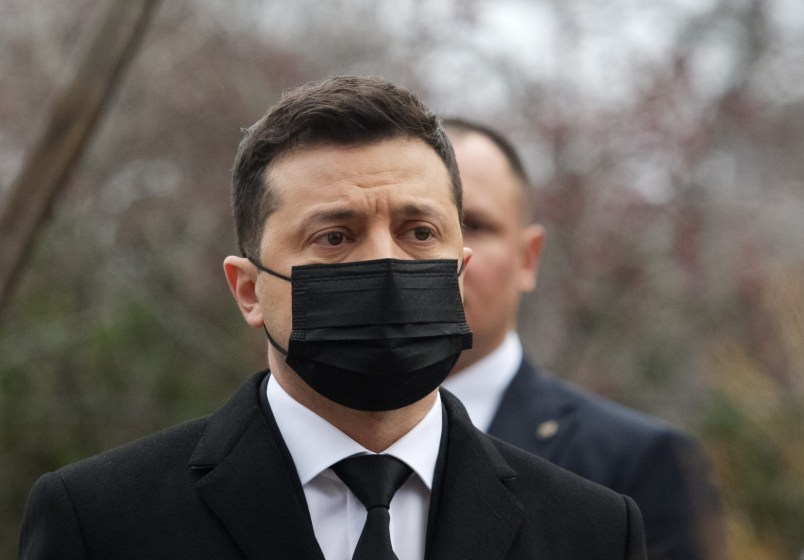With tensions running high in and around Ukraine, the negotiating sides keep pointing back in time to the peace agreement that ended the last major bout of the conflict between Kyiv and Russia-backed separatists in the country’s east.
It’s the Minsk agreements — a set of accords agreed upon by Russia, Ukraine, France, and Germany that first led to a ceasefire in September 2014, and then to another in February 2015.
The agreements seek to end the war that has flared up sporadically for the better part of a decade in Ukraine’s east, provided the Ukrainian government and Russia-backed separatists implement certain conditions. So far, those conditions have not been met.
Now, with Washington proclaiming that a Russian invasion may be “imminent,” nearly every side in the conflict — Russia, the U.S., Ukraine, western European nations — have drawn attention to the agreements. Most recently, Russian Foreign Minister Sergey Lavrov remarked on Friday that if the U.S. “forces Kyiv to implement the agreements, we will of course be satisfied by that result.” Both President Biden and Ukrainian President Volodymyr Zelensky alluded to the agreements in separate read-outs of their Thursday evening call.
Ukrainian and Russian diplomats met in Paris this week to discuss implementing the seven-year old deal, providing a potential exit from the crisis.
Understanding the agreements — generally overlooked in American media — helps shed light on how the situation in Ukraine has developed, and whether there may still be a diplomatic off-ramp away from violence.
Ukraine signed the agreements in February 2015 after a series of battlefield defeats, stabilizing the conflict, provided it implement key provisions of the deal: in exchange for regaining control of its own border, Ukraine would have to pass constitutional changes that devolve political power to the two breakaway regions, done in consultation with members of the Russian-backed militias in the east.
Since then, negotiations have disintegrated into arguing over in what order to implement the deal’s provisions, with talks dragging on since 2015.
“Russia saw this as, they won on the battlefield, it’s a victor’s peace,” Samuel Charap, a senior political scientist at the RAND Corporation, told TPM on Wednesday. “Since then, the ambiguities have been exploited by both sides; the Russians wanted action, the Ukrainians wanted inaction.”
The current bout of tensions — and threat of all-out war — between Russia and Ukraine has reinvigorated talks around the deal, with both sides signaling it may be a way out.
But Kyiv, at this point, regards the deal’s provisions giving breakaway regions special constitutional status as a trojan horse for Russia. The provisions would give those eastern provinces a lever of control, both on Kyiv’s domestic policy but also its foreign policy.
Zelensky, who won an election in 2019 after campaigning in part on promises to make peace with the Russians, has been unable to implement the deal, facing violent threats from Ukrainian nationalists on the country’s far-right whenever it seems that progress might be made.
Volodymyr Fesenko, a Kyiv-based political analyst, likened the dilemma to TPM as a choice for Ukrainian officials between two horribles: political instability caused by Minsk’s implementation, or the threat of a Russian attack if talks drag on.
“It’s either a rupture within the country or the threat of Russian aggression from without the country,” he said.
So far, it’s not clear whether revived negotiations around Minsk will lead anywhere. Kyiv has been asking Russia to “change” the terms of the agreement, something that the Russian government has regarded as unacceptable.
“It’s possible for us to fulfill them, but not as they’re currently written,” Fesenko said.
It remains unclear whether Minsk will remain the route that Russia focuses on, or if it’s abandoned the agreements as a viable path of resolution.
Russia has raised the stakes beyond simply Minsk. It’s demanded from the U.S. guarantees that Ukraine will never join NATO, and that the alliance limit troop deployments in former Warsaw pact countries and former Soviet republics.
“The challenge now is that Russia is addressing its demands to other actors,” Charap remarked. “They seem to have concluded that it’s impossible to do business with the Ukrainian government.”
Dmitri Trenin, head of the Carnegie Moscow Center, pointed out recently that the decision on what to do — war or no war, Minsk or another path — lies entirely with Vladimir Putin.
“Putin is a pre-communist leader in that sense,” Trenin said. “He is a tsar.”







Personally, I think Russia has bit off more than it can chew here and is looking for a face saving way out. The region will shift to NATO (and that may be unavoidable at this point) because Putin miscalculated about Biden’s and NATO’s resolve. I think the chances of a major invasion have dropped in the past 2 weeks b/c the political calculus for Putin has gotten tougher.
That and the economic impacts of being booted from SWIFT, Nord stream 2 in peril, etc…
The humorous part is that Putin said he would stop the gas flow if Nato retaliated for an invasion of Ukraine and then Nato said “not if we stop the gas first”.
Yes. In addition, every commentary I’ve seen/heard on this is that the Ukrainians will fight. Even if the Russians were to overrun the country, the last thing Putin wants/needs is another Chechnya.
Does anyone know the financial cost this sabre rattling is costing the Russian people?
And would any changes/modifications in the agreement piss off the Russian favoring folks in the eastern regions?